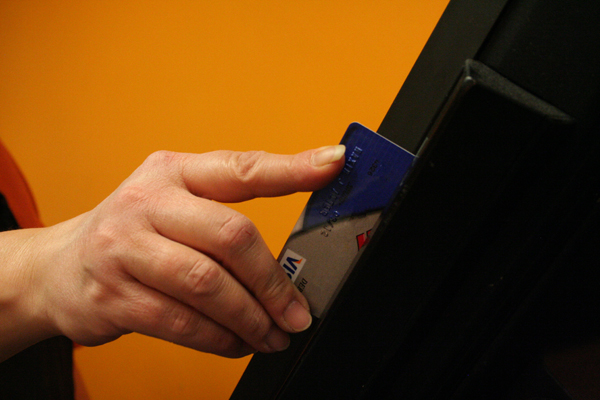

With the passing of the 2010 Credit Card Accountability, Responsibility and Disclosure Act (also known as the Credit CARD Act) new laws are now in place designed to protect consumers from common tricks and schemes credit card companies employ to pile on debt to unsuspecting consumers.
Not the least of those consumers are college students, who typically show a disregard for the seriousness surrounding credit card debt, and the effect said debt can have on their credit.
In fact, a recent Sallie Mae study showed that debt among college students is averaged at just over $3,000 dollars, with a whopping 82 percent of college students revolving debt each month.
Professor Theodore A. Clark, whose area of expertise is in market research and consumer behavior, warns against the dangers of abusing a credit card, and the lasting effect that it can have on one’s credit.
“If you have access to a credit card and use that credit card ineffectively or incorrectly, it can cause a mountain of debt that will stick with you for years after you’ve left college,” said Clark. “Students need to understand whether it may be employment, getting a home or going to school, it’s your everything. It’s the one thing, I think, that will follow you your whole life.”
Navigating safely through the world of credit cards, interest rates, fees and credit scores can be tricky, but there are a few things that students can do to avoid being trapped in a cycle of debt.
“Many students make the mistake of accepting cards with credit limits that are too high. A card with a manageable limit makes sense. In addition, students need to either pay the balance in full each month or pay more than the minimum because the minimum creates too many interest charges and increases the debt if not paid monthly,” said Clark. “Another mistake students make is to have more than one credit card and use cash advances to pay the second card.”
Dan Sistarenik, director of Financial Aid agrees, stating that credit cards should never be used for large purchases, and should always be paid off by the end of the month.
“They should always be re-paid in full within 30 days to avoid the high interest rates and fees. Some use them for convenience or small emergencies but they can easily add up and get out of hand if not re-paid in full monthly,” said Sistarenik.
Jacqueline Bahr, a fourth-year electrical engineering major, is not a stranger to the trouble that can go along with having a credit card. When she got one shortly after she graduated from high school, she thought having it would make her more responsible, but was never made aware of exactly how damaging credit card debt could be.
“I was aware of that possibility, but I didn’t understand how serious it was. I was only 18 and I was too immature to care about my credit score. I thought it could easily be fixed,” Bahr said.
Another way credit card companies prey on uninformed consumers is through fees. The new Credit CARD Act reduces the amount of fees that a credit card can apply to any given billing cycle; no charging over-limit fees unless the cardholder elects to allow purchases which go over their limit and can only charge one over-limit fee per billing cycle, no charging cardholders for paying a balance i.e. over the phone, or internet and in the first year of issuance non-penalty fees cannot exceed 25 percent of the card’s limit.
Still, these new regulations do not, and will not, stop credit card companies from slyly charging fees for reasons only they can explain.
“People should watch out for that. After I paid my bill in full, they tried to add additional late fees and interest,” Bahr said. “I guess they didn’t think I was smart enough to argue about it because it was very easy to get them to waive the fee. They will try to get away with anything that you allow them to.”
Credit cards can be excellent tools to use when trying to build credit, but they can also ruin a financial career if the cardholder does not appraise themselves of the user agreement they sign when they open the account. Also, students should never consider charging their education to a credit card.
“Student loans are far better choices than any credit cards to help pay for college as they have low fixed-interest rates, in-school deferment of payment and even some cancellation benefits in certain cases. Student loan interest is also tax deductible. Grants are the best form of aid as they don’t have any re-payment,” said Sistarenik. “We never recommend credit cards.”

Student loans are well on their way to overtaking credit card debt. Americans are now paying down their credit card debt at a much slower pace than during the months immediately following the Lehman collapse in September 2008, but they continue to do so all the same. Additionally, the delinquency rate on U.S. credit cards – 3.04% in September, according to Moody’s, is at a record low.
Falling delinquencies have led to lower defaults, which will keep falling for months ahead, even as the late payment curve may have bottomed out already.
Moreover, the monthly payment rate (MPR), which measures the ratio of their credit card debt Americans are paying back at the end of each monthly cycle, was at 21.29% in September, compared to a historical average in the mid-teens.
If that is the new normal, it will ensure that low delinquencies and defaults are also here to stay. Of course, there is also the possibility that, once we get back to full employment and consumer confidence improves, everyone will fall back into their free spending pre-Lehman pattern. Unfortunately, we are unlikely to be able to test our propositions anytime soon. http://blog.unibulmerchantservices.com/americans-slash-credit-card-debt-to-lowest-level-in-more-than-7-years